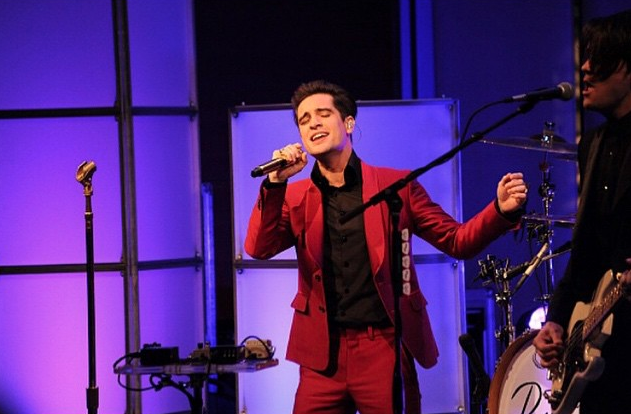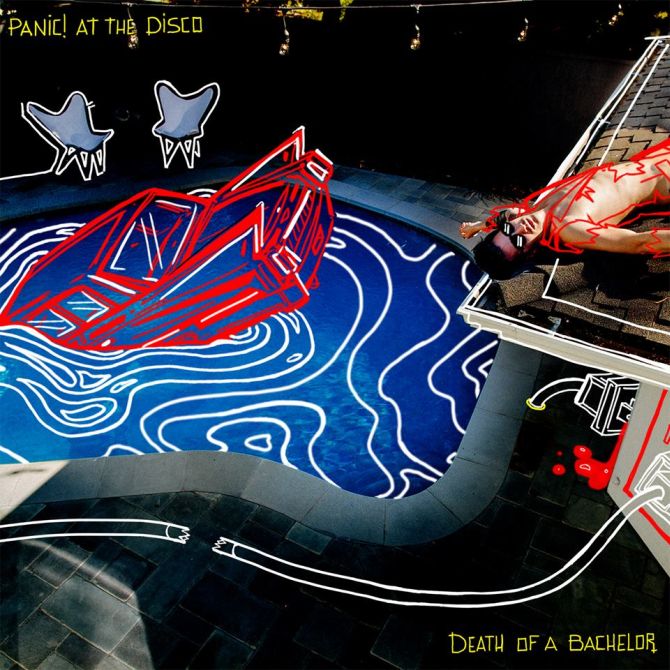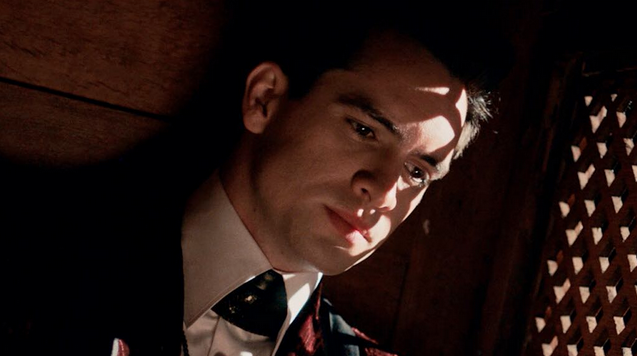What does "Don't Threaten Me with a Good Time" by Panic! at the Disco mean?
"Don't Threaten Me with a Good Time" Lyrics Meaning
Panic! at the Disco's new album Death of a Bachelor (similarly named to one of the songs on the album that I've explained) just came out on Friday, and the album's pretty rocking. I'm excited to see where it premieres on the Billboard charts after it's been out for a week, but based on what Panic! at the Disco fans have been saying, I'd have to guess that it's going to be quite popular.
Lyrics-wise, "Don't Threaten Me with a Good Time" continues Brandon's theme of accepting the bad and forcing it to seem good or to be good. We saw the same thing when we analyzed "The Emperor's New Clothes" in which Brandon travels to Hell and becomes a powerful demon. "Don't Threaten Me with a Good Time" is rather confusing, so you're going to have to decide for yourself whether he's implying something or what that may be. I'll talk more on it at the end of this post.
Meaning of "Don't Threaten Me with a Good Time" by Panic! at the Disco
When you listen to this song, you'll notice the rock riff from "Rock Lobster" by the B-52's. "Rock Lobster" is a crazy surreal song, and the reference adds to the surreality of Brendon Urie's song about a wild party and the morning after.
And that wide-eyed, hungover, morning-after feeling is exactly what "Don't Threaten Me with a Good Time" is about. Panic! at the Disco/Brendon Urie needs no urging to attend and participate in a wild party.
In the Hook, Urie sings, "Alright, alright, it's a hell of a feeling though." He's prepping his listeners to hear what he's about to say and to be open to experiencing what he experiences. The use of the word "though" suggests that he knows there are negatives to what he's up to but that he's arguing that his lifestyle is worth it even still. The rest of the song is mainly lists of the places he wakes up the morning after, so he's saying that not knowing where he'll wake up and still taking the risk is "a hell of a feeling."
In Verse 1, Panic! at the Disco sings, "Who are these people? / I just woke up in my underwear / No liquor left on the shelf." Urie got drunk last night, and now he's awaking to find out where he is. The rest of the verse includes a reference to what he was wearing ("a cane and a party hat"), drugs ("five-thousand people with designer drugs"), and his thirst for more ("Don't think I'll ever get enough"). And, apparently, Urie is the greatest partier of them all; he claims to have been the "king of this hologram," likely a reference to the "coolness" of the party and to its lack of positive substance. You can see the hologram, but it's easily turned off, and you can't touch it.
In the Pre-chorus, things seem to get really out of hand. In the first two lines, Panic! at the Disco mentions, "Champagne, cocaine, gasoline / And most things in between." The first gets people drunk, the second gets people high, and the third increases the flammability of things. This party will be marked by a lack of inhibitions, presence-of-mind, and safety. Things could very easily get out of hand.
Urie sings, either during the party or after, "I roam the city in a shopping cart / A pack of camels and a smoke alarm." The shopping cart is likely stolen, and he probably looks crazy pushing it around. The cigarettes could set off the smoke alarm, which seems to be purposefully chosen for its irony. Smoke alarms are meant for safety, but Urie's just trying to set it off.
The Chorus increases the intensity of the song's theme overall. PATD sings, "This night is heating up / Raise hell and turn it up." He then prepares to incorporate the song's title when he threatens himself, "If you go on, you might pass out in a drain pipe." He retorts, "Don't threaten me with a good time." For some reason, Urie's accepted the party experience to such an extent that he's romanticized the possibility of party after-effects. They're part of the fun for him.
In the Second Verse, when Urie sings, "What are these footprints? / The don't look very human-like," he's not necessarily suggesting aliens or monsters; he's just adding to the surrealism and oddity of his experience. "Who knows where they came from?" he seems to ask. He continues his wake-up process by wanting to "find [his] clothes."
He mentions "[b]edsheets and a morning rose." While the bedsheets suggest a hook-up, the "morning rose" reference is difficult to decipher. Not even Urban Dictionary has a reliable definition for this phrase. It could simply be an actual rose, but Genius.com suggests it could stand for a hickey. [A little help deciphering this one?]
Panic! at the Disco continues by singing about wanting to "wake up." Apparently, he "[c]an't even tell if this is a dream." And that's part of the fun for him--the striving to wake up--the unreality of reality. He asks how he and his friends ended up in his "neighbors' pool," but he calls their waking view "perfect," again suggesting that he's enjoying this process.
The rest of the verse continues to list his crazy escapades: he goes "bar-to-bar," travels all over town, and loses his "mind in a wedding gown" he's wearing. He ends by singing that he doesn't "think [he'll] find [his mind] now." He's let everything go and is not seeking for normalcy or sobriety.
In the Bridge, Urie continues describing the chaos of his after-party scene. He sings, "I'm a scholar and a gentleman / And I usually don't fall when I try to stand." He's typically sober and is able to impress people when he's not drunk, but right now, he's wasted. To demonstrate just how upside down things have turned, he explains that he "lost a bet to a guy in a chiffon skirt / But I make these high heels work." Men are wearing women's clothing--i.e. the world is unpredictable and things feel reversed.
He begins finishing the bridge by explaining that he's not "as think as you drunk I am"--a Friend's reference. At the end of the bridge, the party finally ends: "And we all fell down / When the sun came up / I think we've had enough." Finally the wild party is over, and all can return home to put themselves back together.
Romanticization
Romanticization is a bad thing. Merriam-Webster defines it as "to think about or describe something as being better or more attractive or interesting than it really is." Basically it means to fool others and yourself about how good something was--lying. Ever heard a grandparent talk about "the good old days"? Ever heard a parent say they wish they were kids again because things were so much simpler? Ever gone back to re-read a book or re-watch a movie that you loved and found that you had remembered it as better than it was?
That's what romanticization is all about, and the process is universal. Anytime anyone tries to believe that something or someone is better than it or he/she actually is, that's romanticization. If you want a good example of it, Julia Blanchard gives a short and digestible example in her blog post.
And romanticizing is exactly what Urie is doing in his song. He's looking at bad experiences and confusion and chaos and talking about how great they are. It's difficult for most, I think, to see the appeal in what he's singing about, but he tells us to not "tempt" him with this kind of experience because he'll take us up on it.
Is he romanticizing getting drunk and hung over and partying wild? Perhaps. Or perhaps he actually enjoys it. I try very hard to stay neutral on this site, and I like Panic! at the Disco very much, but I think he needs to realize that being drunk, doing things unconsciously, and waking up bewildered and confused are not good things to be praised or to be romanticized.
Of course, if this is all satire...then we've got to start over again. Please leave your opinions below. Time to tackle another one!







